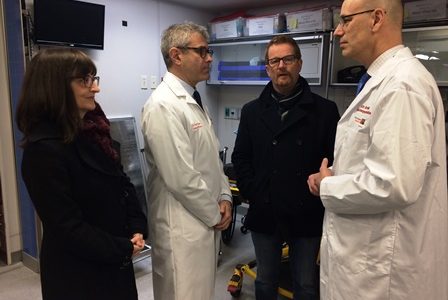MMU services have moved
VCH, along with our partners at BC Emergency Health Services at PHSA, PHC, community partners and the City of Vancouver, are transitioning the services currently provided at the BC Mobile Medical Unit (MMU) to more permanent programs and services in the community. The MMU was deployed as a temporary measure in December due to the spike in overdoses in the Downtown Eastside (DTES). Under the leadership of the VCH/PHC Regional Emergency Program, protocols were developed to allow low-risk overdose patients to be taken by ambulance and via walk-ins, to the MMU for monitoring. While the overdose crisis continues, in recent weeks use of the MMU has declined as other services have come on stream. From March 12 to March 18, for example, 11 people visited the MMU as a result of an illicit drug overdose (overdose reports can be viewed here).
DTES overdose and substance use services
- The DTES Connections clinic opened March 1 and is already treating more than 110 clients. Clients can start on Suboxone or methadone right away, with their first dose provided within two hours.
- Substance Use Treatment and Response Team, or START, opened in August in Vancouver. The program provides rapid access to at-home detox for those who need help stopping or stabilizing their substance use. To date, over 140 clients have received services.
- The St. Paul’s Rapid Access Addictions Clinic (RAAC) is now open, acting as a new outpatient addiction clinic where clients can access treatment and care.
- Paul’s Hospital will be opening the HUB this spring, where specialized addictions nurses and physicians will provide faster and better care for people with mental health and substance use challenges. The HUB will triage an estimated 6,000 patients each year, which is more than half the patients who visit the ED annually.
- Four overdose prevention sites are open in the DTES providing a safe space to be monitored and access to take-home naloxone kits.
- Clients can also continue to receive primary care, substance use services, methadone and public health services at the Pender and Downtown Community Health Centres in the DTES.
Transition plan
- As of April 5, BC Ambulance are taking overdose patients to St. Paul’s and Vancouver General Hospitals, and may take low-risk overdose patients to any appropriate community clinic, including DTES Connections.
- DTES Connections will continue to see clients seeking treatment seven days a week, and the clinic’s hours will soon be extended. The timing of this will be confirmed at a later date.
- A VCH outreach worker and social worker, who have followed clients seen at the MMU, will work at the MMU Monday-Friday during the month of April and May and will redirect clients seeking treatment. They can be reached at 604-360-2874.
- 24/7 security staff will remain at the MMU during the month of April and May and can also redirect clients.
- Supplemental staff will remain, as long as required, at St. Paul’s Hospital Emergency Department to assist in managing overdose patients.
The current plan is to complete the MMU transition by the end of May, but we will continue to monitor the impact of the overdose crisis and will be ready to reactivate it if needed. Over the coming days and weeks, we will be working with our community partners to ensure people are aware of these changes and let them know where to access other permanent programs.
Team effort
Of course, we would be remiss if we didn’t continue to thank all our Vancouver and PHC staff and physicians who have come together to serve at the MMU and for the opportunity this has created for Community, Acute and Public Health staff and physicians to work jointly to combat this crisis. We also extend our thanks to BC Emergency Health Services, the City of Vancouver and the many community partners who have worked with us at the MMU over the last four months.

